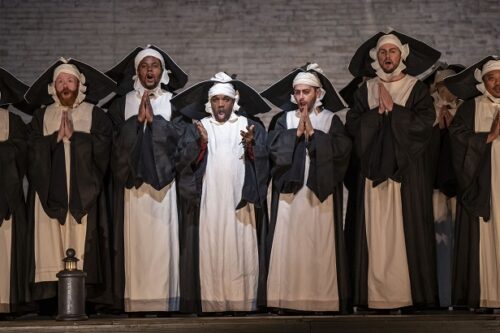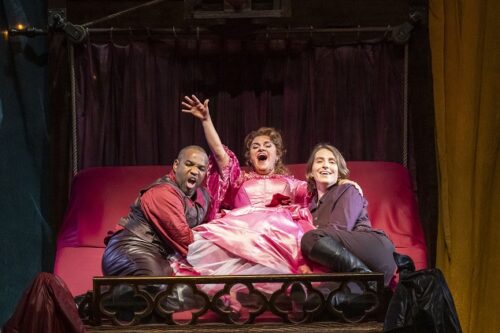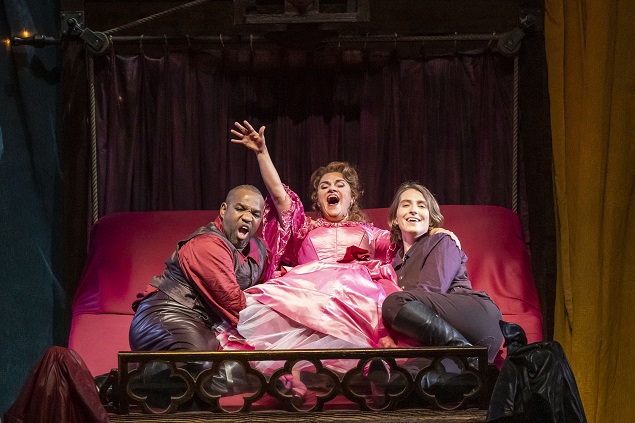 United States Rossini, Le comte Ory: Soloists, Chorus and Orchestra of Lyric Opera of Chicago / Enrique Mazzola (conductor). Civic Opera House, Chicago, 26.11.2022. (JLZ)
United States Rossini, Le comte Ory: Soloists, Chorus and Orchestra of Lyric Opera of Chicago / Enrique Mazzola (conductor). Civic Opera House, Chicago, 26.11.2022. (JLZ)

Production:
Original Director – Bartlett Sher
Revival Director – Kathleen Smith Belcher
Sets – Michael Yeargan
Costumes – Catherine Zuber
Revival Lighting – Chris Maravich
Choreographer – August Tye
Fight Director – Chuck Coyl
Chorus master – Michael Black
Cast:
Ory – Lawrence Brownlee
Adèle – Kathryn Lewek
Isolier – Kayleigh Decker
Ragonde – Zoie Reams
Raimbaud – Joshua Hopkins
Alice – Lindsey Reynolds
Tutor – Mirco Palazzi
First Courtier – Lunga Eric Hallam
Second Courtier – Wm. Clay Thompson
Rossini’s Le comte Ory (1828) at Lyric Opera of Chicago was a true delight, a celebration of vocality with Lawrence Brownlee and Kathryn Lewek and their virtuosic abilities topping the talented cast. Bartlett Sher’s production of the comic opera as a play within a play enhanced the work, creating a framework for the sometimes-silly plot turns.
Sher’s approach brings to mind Thornton Wilder’s dictum that ‘One way to shake off the nonsense of nineteenth-century staging is to make fun of it’, and Sher did it in good humor. This works operatically, since some elements evoke Richard Strauss’s Ariadne auf Naxos. The onstage theater staff interacted with the singers and, in doing so, contributed unscripted humor to the genial presentation.
The sets were perfect, with clichéd props setting up the scenes effectively. For example, a suspended window frame served well for Ragonde early in the opera and, when the scene ended, it neatly disappeared into the fly tower. This witty stagecraft, along with colorful, over-the-top costumes, supported the score masterfully.

The cast is at the heart of the production, and they delivered with remarkable skill. As Ory, Brownlee gave his usual flawless performance, his vocal pyrotechnics balanced by an impeccable sense of style. He facilitated the ensembles by modulating his dynamic levels to support his vocal partners, like Kathryn Lewek in their duet ‘En proie à la tristesse’ in the first act and, especially, the duet ‘Ah! quel respect, Madame’ in Act II. His solo passages were notable for the even tone and pitch-perfect melismas that characterize his portrayals of Lindoro in The Barber of Seville or Arturo in I puritani. It was even more remarkable here because of the amount of stage action. Brownlee made it all seem easy without ever missing a note.
Kathryn Lewek was the perfect Adèle and created a convincing character. Her even range, clear sound and smooth, almost instrument-like, melismas were a treat for the audience, which cheered as strongly for her virtuosic delivery as they did for her comic timing. Lewek’s awareness of the vocal fireworks made it all the more enjoyable, and she never lost control in the relentless runs that Rossini gave to the part.
Complementing those two, Kayleigh Decker made the role of Isolier come alive from the start, and her facility with bel canto resulted in an elegant performance. She matched the other principals particularly well in the Act III trio, ‘À la faveur de cette nuit obscure’, which involved a masterful bit of blocking as Isolier thwarted Ory’s attempts to seduce Adèle in the lavish, oversized bed at the center of the stage. An alumna of Lyric’s Ryan Opera Center, she is slated to sing the role of Ruggiero later this season in Handel’s Alcina by Les Violons du Roy.
Mirco Palazzi was engaging as the Tutor, and his resonant bass filled the hall in ‘Veiller sans cesse’. Baritone Joshua Hopkins was equally impressive as Raimbaud, both vocally and in his comic timing. As Ragonde, Zoie Reams did a beautiful job which added to the overall quality of the production.
The staging could not succeed without the deft touch of the chorus, which benefited from the superb leadership of Michael Black, and the orchestra responded with care to the nuanced direction of Enrique Mazzola. This attention to detail on every level made the performance stand out among other offerings in the current season.
James L. Zychowicz
